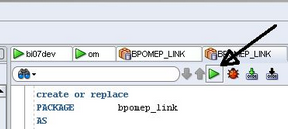This is my problem: we have a stored procedure called HEAVY_SP and depending on how it is executed, execution time is greatly increased:
(1) Call execution
Direct execution in Oracle SQL Developer IDE
CALL HEAVY_SP(0, 'F', 5, ...)
takes 15 seconds (our current solution)
(2) Using play button
Opening the procedure using Oracle SQL Developer and executing the "play" button:
takes 15 seconds
(3) dbms_job : scheduled mode
takes 15 seconds
(4) dbms_job : instant execution mode
takes more than 1 hour
Reviewing how data in processed, we are detected that each iteration is very slow.
(5) From SQL_PLUS (linux)
Takes more than 1 hour, iteration very slow
(6) From JAVA
Takes more than 1 hour, iteration very slow
(7) From TOAD
Takes more than 1 hour, iteration very slow
Research
We have eaten a lot of google pages such as the following:
why-does-a-query-run-slower-in-a-stored-procedure-than-in-the-query-window
oracle-pl-sql-procedure-runs-slower-than-sql
oracle-insert-in-stored-procedure-very-slow-compared-to-insert-run-manually
stored-proc-running-30-slower-through-java-versus-running-directly-on-database
So my questions are :
- Why Oracle act this way?
- Shouldn't it behave fast in all scenarios (same parameters)?
- Stored Procedure must be modified?
- If query plan, trace files or statistics shows different behaviors, stored procedure must be fixed ?
- Why execution in query window is fast?
Thanks in advance.
Tips from comments
TIP #1
Following the recommendations of @BobJarvis about statistics
Result : Our statistics are up to date. Even, we re executed EXEC DBMS_STATS.GATHER_TABLE_STATS(ownname=>'SOME_USER', tabname=>'SOME_TABLE', cascade => TRUE); in all problematics tables and the result is the same.
TIP #2
Following the recommendations of @KonstantinSorokin
I suspect execution plans may differ due to a difference in sessions settings. Consider comparing v$ses_optimizer_env
Result : We have compared and result v$ses_optimizer_env is the same for (1) and (4) scenarios.
TIP #3
Using this query:
select s.sid,s.serial#,s.username, s.machine,replace(q.SQL_FULLTEXT,chr(0)) sql_text, s.program, s.logon_time, s.status, s.OSUSER
from v$session s, v$sql q
where
s.status='ACTIVE'
and s.username is not null
and s.sql_hash_value = q.hash_value
order by s.LOGON_TIME, s.username;
I've noticed that machine, program and ouser change depending of the test:
FAST MODE (query window)
machine | program | ouser
--------------------|------------------ | -------
my laptop username | SQL DEVELOPER | User
LAG MODE (background execution)
machine | program | ouser
--------------------|------------------ | -------
ip-10-6-7-1 | oracle@ip-10-6-7-1| rdsdb
TIP #4
Following the recommendations of @KonstantinSorokin related to traces.
Result : A temporal DBA has investigated and He told us that some sql_id have different execution plans. His advice was : use hints.
This could be the solution but, why some SQL ID have different executions plan?
[SOLVED]
Thanks to @IsaacMejia, NLS_COMP=LINGUISTIC was the reason of slowly execution. So java was not the cause of problem. Oracle misconfigurations were the cause of our problem.
Solution must be set the correct value for NLS_COMP=BINARY at instance level.
But in my case, I have several applications working well with this value. So in order to avoid ordering and comparisons issues in our applications, I can't override instance NLS settings.
Temporary solution is execute at the beginning of stored procedure :
execute immediate 'alter session set NLS_COMP=''BINARY''';
and return to previous value at finish :
execute immediate 'alter session set NLS_COMP=''LINGUISTIC''';
Now stored procedure run fast as directly execution in query window (ORACLE SQL DEVELOPER)


DBMS_STATS.GATHER_TABLE_STATISTICSfor each of the tables? – Dak... and date_column = '01/01/2000'it might work differently depending on the client defaults. Can you share the code? – PreceptorDBMS_STATS.GATHER_TABLE_STATISTICSshould be run regularly on any table which is being changed. If you don't choose to do that I suggest adding a RULE hint to every query to run to tell the database to use the rule-based optimizer, which doesn't make use of internal database statistics. Best of luck. – DakSELECT LAST_ANALYZED FROM ALL_TABLES WHERE TABLE_NAME='table-name'. Best of luck. – Dakv$ses_optimizer_env,v$parameter– Vase